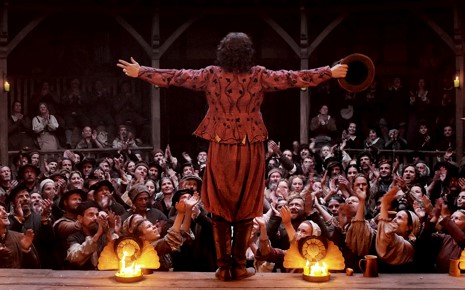
To listen to this reflection as a podcast, click here.
More than 500 years ago, during the time of Shakespeare, there were no TVs, movie theaters, or handheld communication devices.
There were also no video games, pizza joints, destination vacations, cruises, or team sporting events in gigantic arenas.
What could average people do for entertainment?
They could attend live theater, of course – if they could afford it.
It cost four pennies to experience a three-hour production at Shakespeare’s famed Globe Theater in London. The vast majority of Londoners, however, would never be able to find four pennies in their couch. Most didn’t have couches, for that matter.
Shakespeare, an astute businessman, made a bold decision. He welcomed those who could pay just one penny.
These humble customers would drop their penny into the money box (it was secured in a place that eventually became known as the box office) and then walk into the theater. The one-penny customers couldn’t afford an actual seat, but they did have permission to stand right by the stage.
Ultimately they even came to have their own identity. They were known as the groundlings.
The groundlings could actually reach out and touch the actors. This turned out to be rather exciting for everyone concerned. It was definitely in the actors’ best interest to be on good terms with those in the cheap seats – or rather, those who had no seats.
Historians have concluded that something like 40% of those who attended Shakespeare’s plays had no more than a fifth-grade education. That’s why most Shakespearean plays begin with a bang: cackling witches, illicit sex, flashing swords, and the like. It was important to grab the groundlings’ attention from Minute One and never let it go.
Strange as it may seem, the best way to evaluate the success of a play (or the skill of its cast) was to measure the drool of the groundlings. Shakespearean scholar Elliott Engel points out that as those standing up front became mesmerized by the action, saliva would sometimes drip from their open mouths onto the stage.
Long before OSHA came into the world, such puddles of drool could be major hazards for the actors. Cast members feared going downstage – at the Globe, “downstage” literally meant walking down a gentle slope toward the audience – and slip-sliding away.
It’s always been bad luck to say to an actor, “Good luck!” Instead, you might express the hope that he or she would perform so well that the groundlings would work up a major slobber – because of which the actors might slip, fall, and hurt themselves. This accounts for the origin of the expression, “Break a leg!”
Engel notes that the only person who appears to have taken this expression as actual advice is ice skater Tonya Harding.
“Groundling,” of course, was not a term of affection. It was shorthand for those who were deemed ignorant, boorish, or uncivilized.
History is replete with such terms. The ancient Greeks spoke of hoi polloi (literally, “the people”), meaning the majority of the population who were dismissed as simpletons. Rabbis of Jesus’ time spoke of am ha’aretz (“the people of the land”), referring to unschooled Jewish peasants who couldn’t be expected to understand the finer points of the Torah.
We still talk about “the great unwashed,” “the rabble,” or Rednecks. In most human societies, those who picture themselves as deserving the luxury suites have invented terms for those relegated to the bleachers.
What stands out in the ministry of Jesus is that he spent almost all of his time with the groundlings.
Eleven of the 12 disciples he recruited came from Galilee, the first century equivalent of Podunk. Only Judas, who betrayed him, came from the more uppity region of Judea.
There isn’t a single incident in the Gospels in which Jesus pursued what we might call a celebrity conversion. He offered grace to everyone, showing no favoritism to the well-heeled or influential.
Author Philip Yancey observes, “The more ungodly, unwholesome, and undesirable the person, the more that person felt attracted to Jesus. And the more righteous, self-assured, and desirable the person, the more that person felt threatened by Jesus… Consider who Jesus hung out with: a prostitute, an unclean man with leprosy, a moral outcast, a Roman centurion, a mixed-race woman with five divorces. Meanwhile the Pharisees – upright citizens who studied the Scriptures and scrupulously obeyed the law – the ruling establishment, the pillars of society: all these saw Jesus as a threat.”
He announced, “The first shall be last, and the last shall be first” (Matthew 20:16). It’s clear that Jesus expected Self-Made People to find it hard to receive his offer of his love, while the groundlings would embrace the Good News and change the world. Which is exactly what they did.
It should break our hearts to ponder how much energy we invest in categorizing other people: those who matter, those who don’t, those whom I need to cultivate, those whom I need to avoid.
As theologian Francis Schaeffer taught: With God, there are no little people, and there are no little places.
May God give us the grace never to look down on one of his one-penny saints.
After all, the Gospels suggest that they’ll have the best seats in the house at the Great Banquet in heaven.
